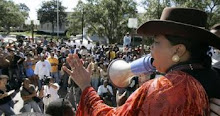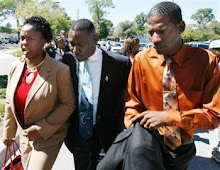
Article
By Emanuella Grinberg
Court TV
PANAMA CITY, Fla. — A medical examiner said Friday that he was aware of tremendous political pressure to "resolve" the case of a teen who died after an altercation with guards at a Florida boot camp for juvenile offenders.
But Hillsborough County Medical Examiner Vernard Adams insisted that the pressure did not influence his opinion that Martin Lee Anderson, 14, died from suffocation at the hands of eight boot camp employees.
"I wasn't just working for my county. I felt an obligation to do a good job for Florida," Adams said.
Drill instructors Henry Dickens, Charles Enfinger, Patrick Garrett, Raymond Hauck, Charles Helms Jr., Henry McFadden Jr., Joseph Walsh and nurse Kristin Schmidt each face up to 30 years in prison if convicted of aggravated manslaughter of a person under 18 for the teen's death.
The eight defendants, ages 30 to 60, say Anderson provoked the encounter by refusing to participate in a 1.5-mile mandatory run to gauge his fitness.
A surveillance video of the altercation shows the guards manhandling the teen, covering his mouth and waving ammonia capsules in his face on three separate occasions, once for as long as five minutes, while Anderson appeared to pass in and out of consciousness.
The incident sparked a national debate over safety in the paramilitary-style boot camps, resulting in the closure of similar programs in Florida. A federal investigation is also pending into reports of child abuse at boot camps across the country.
Anderson's death also resulted in the dismissal of the state's top law enforcement agent, Guy Tunnell, who, as sheriff of Bay County in the 1990s, created the Bay County Boot Camp.
Adams was the second medical examiner to perform an autopsy on Anderson after he died on Jan. 6, 2006, less than 24 hours after entering the Bay County Boot Camp for violating his parole on a grand theft auto charge.
Charlie Siebert, the first pathologist to examine Anderson's body, concluded that he died of complications from sickle-cell trait, a genetic disorder that impedes the flow of oxygen in the blood.
His findings provoked allegations of a cover-up by the Bay County Sheriff's Office, which operated the boot camp in Panama City. In response, former Gov. Jeb Bush appointed a team of special prosecutors from Hillsborough County, who ordered the second autopsy.
Adams denied that the fate of Siebert, who faced public condemnation and lost his job after releasing his findings, had any effect on his report, as a defense lawyer for Helms suggested.
"You didn't want to wind up like Charlie Siebert?" attorney Waylon Graham asked as he paced across the courtroom. "So you wrote a safe report that insulated you from what Charles Siebert went through?"
"I could not know what the reaction was going to be," Adams said. "I had to assume that, no matter what I opined, I would be criticized from one quarter or another."
In a lively exchange with Graham, who has taken charge of most of the questioning of the state's witnesses, Adams also downplayed the attorney's characterization of the investigation as "the autopsy of the century."
Siebert was on hand for the examination, along with representatives from the state attorney's office and famed pathologist Michael Baden, a forensic consultant hired by the Anderson family, who testified in the murder trial of music producer Phil Spector.
Even though Baden was "kind of a pest," Adams said, he let him observe the proceedings, but refused his request to use the scalpel on the exhumed body.
Adams also denied that he was favoring Anderson's family by permitting Baden to attend while denying Siebert's request to have a medical examiner from Fort Myers accompany him.
"I didn't need extra bodies cluttering the room," Adams said, prompting gasps from both the defendants' supporters, sitting on one side of the room, and the Anderson family across the aisle.
Adams acknowledged that before he performed the autopsy in March 2006, Hillsborough County State Attorney Mark Ober told him the governor was "leaning" on him to resolve the case.
But, Adams insisted, Ober never compelled him to reach a conclusion.
"He told me, 'You don't worry about that. Take your time. Do whatever you have to do,'" Adams said. "He didn't care what the outcome was, as long as there was an outcome of some kind."
Adams said he concluded that the teen died of suffocation arising from the guards' excessive use of ammonia capsules while they covered his mouth without giving him a chance to recover.
The doctor said the lack of oxygen prevented Anderson's blood from producing carbon dioxide, leading to a build-up of lactic acid in his blood that ultimately put him in an irreversible coma.
The pathologist acknowledged that the teen's sickle-cell condition aggravated the circumstances by further impeding the flow of oxygen. He insisted, however, that the guards' actions alone would have been enough to kill even a teen who did not have sickle-cell trait.
Defense lawyers contend that Anderson would have died regardless of the former boot camp employees' actions because of his condition, which they were unaware of.
"If Martin Anderson fell during the run because of sickle-cell trait, but for the actions of the guards, would he have lived?" assistant state attorney Michael Sinacore asked Adams.
"Yes," he testified. "No ammonia, no hands, no restraint ... there would be no opinion, because he is alive."
Adams said the guards' excessive use of ammonia made the case one of a kind.
His findings mirrored those of another state medical expert who testified Thursday that the use of the ammonia capsules were the "tipping point" in causing the teen's death.
On Friday, the jury learned that the highly concentrated ammonia capsules used by the guards were not approved by the Food and Drug Administration for use on children.
Toxicologist Cynthia Lewis-Younger testified that the toxic effects of ammonia increase with prolonged exposure and within a confined space.
Prosecutors say the guards covered Anderson's mouth and administered the ammonia on three occasions: once for 54 seconds, again for 57 seconds, and during a five-minute period that was broken up into three episodes.
Lewis-Younger testified that though there were no documented incidents of anyone dying from inhalation of ammonia capsules, she would not rule out the possibility.
The trial will resume Monday.





